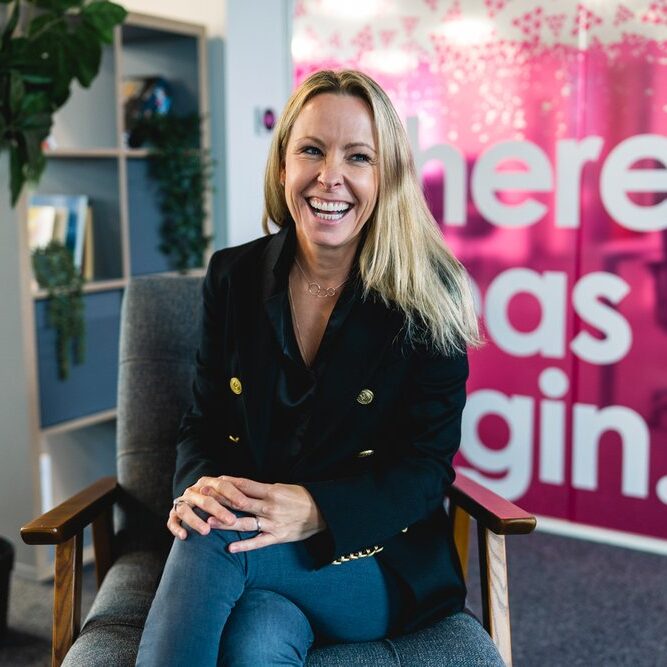The tech sector faces common misconceptions, particularly regarding the belief that a technical background is necessary.

This misconception contributes to a lack of diversity, particularly in gender representation, with female representation declining in cybersecurity. Hayley Roberts, CEO of Distology, is here to help dispel some of these myths surrounding Pursuing a Career in Tech. Her insights are particularly valuable for those considering Switching to a Tech Career and seeking to understand the real opportunities and challenges in the industry.
Following a 20+ year career with blue chip enterprise businesses in retail, recruitment and technology, Hayley Roberts is the founder and driving force behind IT cybersecurity distributor, Distology. The company specialises in identifying, representing and distributing the latest disruptive technology in the cyber security arena.
Hayley has carefully nurtured a unique company culture that encourages vibrancy and ambition and as a result, Distology has won various accolades, including being named CRN’s Distributor of the Year (Sub £250m) in 2022 and the Cloud Distributor of the Year in 2020. What’s more, in 2022 Hayley was also awarded a CRN Editor’s Choice Award for Industry Achievement and was also named Pursuing a Career in Tech Role Model of the Year and Woman of the Year at the CRN Women in Channel Awards in 2021.
Hayley is a leading voice of authority within the industry and sits on the CRN judging panel for Women in Channel, she also features on the annual A list for channel and she is a co-founder of the Channel Community, a networking platform that was set up to create a safe space for people working in the distribution channel, namely cyber security software vendors, resellers and distributors, in order to discuss and share ideas/best practices.
In 2022, Distology has continued to grow its UK team while also expanding across Europe. Hayley led the team through the successful acquisition of Berlin based software engineering specialists, Squareball.
THERE ARE SOME VERY COMMON MISCONCEPTIONS WHEN IT COMES TO CAREERS IN THE TECH SECTOR.
Many think that you need to be from a technical background, whether that’s having previously worked in a tech role or having a tech-related university degree, but this isn’t always the case. However, this perception has ultimately resulted in a lack of diversity amongst the tech workforce, particularly gender diversity.
Looking more closely at gender diversity across the sector, despite there being a considerable effort across the industry to level the playing field and encourage more women into tech in recent years there is still a massive gap across the industry. Especially in cybersecurity, where the latest figures show that female representation in the cyber sector workforce has dropped from 22% to 17%. However, the problem doesn’t stop at gender diversity. Research shows that the tech industry lacks diversity across the board. In fact, TechUK’s Talent Charter details how ethnic minorities are less likely to hold senior positions, as the number almost halves in senior roles – from 25% to 13%.
I am a firm believer that this is a real barrier for businesses as diversity is key to business success. In fact, research from McKinsey has highlighted lacking gender diversity within businesses could be having a considerable financial impact, revealing that companies in the top quartile for gender diversity on executive teams were 25% more likely to have above-average profitability than companies in the fourth quartile.
As such, since founding Distology in 2014, I have made it my mission to get more people interested in a career in tech. To do so, I believe that we need to challenge the preconceived ideas commonly held about careers in this industry. This includes dispelling misconceptions around the opportunities available and highlighting the transferable skills that equip individuals for a successful career in tech, despite not having any previous experience.
One of the most common misconceptions is the lack of options when it comes to roles in the tech industry.
There is so much variety within the sector – a career in tech is often a lot more than inputting code.
There is a wealth of options available, all with different and varied roles and responsibilities. On top of this, there are many career paths in the sector that do not require a computer science degree.
Another common misconception I hear is that to have a successful career in tech, you need to be ‘technically minded’. In reality, this could not be further from the truth. What drives our recruitment strategy here at Distology is hiring based on core competencies rather than experience alone. Whilst, of course, candidates should be interested in technology, ultimately, tech is a solution to a problem and these problems all have human elements. Therefore, candidates who possess both problem-solving and people skills are essential, regardless of whether they’ve previously worked in tech, and would be a great addition to any tech team.
Lastly is the idea that creatives cannot work in tech. Many people believe tech roles are purely analytical and do not offer any room for creativity – this just isn’t correct.
The tech world is full of creatives – from web designers and content creators to marketers and product strategists.
As I’ve already covered, tech is all about solving problems and coming up with more effective ways of doing things, which I would argue requires a great deal of creativity.
Whilst these misconceptions prevent many people from all walks of life from pursuing a career in tech, they are commonly a barrier for women thinking about entering the industry. Knowing just how much value women add to tech businesses, it is extremely disappointing to see that the number of female-held positions is still so low – and in decline across cybersecurity!
As well as delving into myths surrounding careers in the tech sector, it is important to acknowledge that there is a significant lack of education about opportunities available in tech, especially for women. It is this lack of awareness which has led to there being so much misinformation about what working in tech is like, and the requirements to do so. To get to the very root of the problem, I believe that there needs to be more done to address it at the school level. Girls need to be made aware from a younger age of the career options that are available in tech. Hopefully in the not-too-distant future, through collaboration and education, the tech workforce will be just as diverse as the roles within it.








